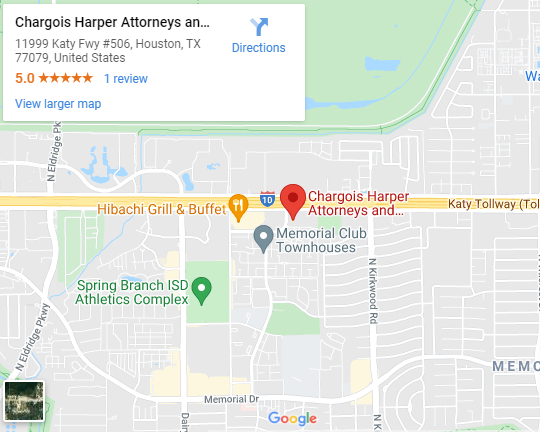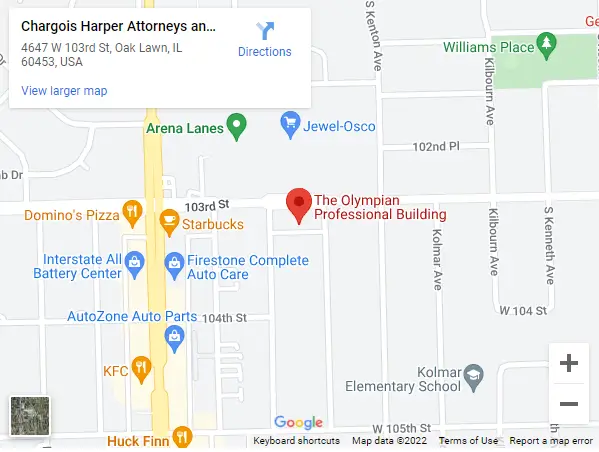Visitation and Parenting Time
Houston Visitation Lawyer & Houston Parenting Time Attorney
Do you have a custody matter in need of an experienced Visitation and Parenting Time Attorneys? Child custody, visitation, and parenting time issues are frequently at the center of every family court conflict.
At the family law practice of Chargios Harper in Houston, we understand parents’ desire to spend consistent, continuing, and quality time with their children, and we have helped hundreds of parents and families accomplish their child custody and visitation goals.
Dealing with legal problems may be hard and daunting, especially if it affects you and your family, but you don’t have to go through it alone. Our Houston family law attorneys at Chargois Harper have the experience and compassion to help you through any family law matter, whether it’s divorce, child support, custody and visitation, or guardianship. Contact our trusted lawyers today.
Why do you need a visitation and parenting time attorney in Houston?
A judge’s decision on child custody and visitation might be influenced by a variety of variables. What is the child’s preferred option? Is either parent an alcoholic, a drug addict or suffering from psychological issues? What is each parent’s availability to meet the child’s custody needs? How does a court decide a child’s best interests? When should I seek the counsel of a psychologist?
Our legal team works closely with forensic psychologists, psychiatrists, and other court-appointed professionals. Many difficulties concerning children and parents’ personal issues are outside the knowledge of court personnel. We can use specialists to establish that your child custody and visitation desires are in your kid’s best interests.
Do your child custody objectives include supervised vs. unsupervised parenting time? Is it critical that you be designated as the custodial parent and that your house be your child’s primary residence? For additional information and comprehensive legal assistance, contact an attorney at Chargios Harper.
How do you find the best visitation and parenting time attorney?
- Experience in Similar Case
One factor to consider while looking for the finest lawyer for you is an experience in comparable situations. Look for an attorney who focuses on the areas that your situation necessitates.
Chargios Harper has demonstrated throughout the years that we know how to work with any issue. Our Houston family law team can help you with everything from legal custody matters to visitation and parenting time.
- Child Custody Case Focus
When looking for the finest child custody lawyer to represent you, look for specialty as well as experience. Our legal office and lawyers focus on child visitation and parenting time cases, and we think that by doing so, we can provide you with the best possible outcome for your case.
- Knowledge of Jurisdiction Laws
Land restrictions differ significantly from one state to the next. The finest visitation and parenting time lawyer for your scenario is one who is well-versed in the local laws. In Houston, it makes sense to employ an attorney who understands Houston law and how to achieve the best possible result. Fortunately, our family law team are here to assist you.
- Accessibility
Accessibility is critical. Not only in terms of being ready to answer queries, but also in terms of sim
Chargios Harper is located in Houston, Texas and Illinois and is accessible to all residents as well as those from other states. Our firm can assist you in saving both time and money.
- Communication
Communication is critical in legal situations like visitation and parenting time. You must retain the services of an attorney who can speak with you and on your behalf with the opposing party, judges, other attorneys, and your spouse.
They may also need to communicate with persons that do not work in family law, such as accountants. Skills in this area are naturally crucial.
With years of experience on visitation and parenting time, we can assist you in communicating, ensuring that you are heard, and obtaining the best possible result.
- Consider your financial resources.
Hiring an attorney is usually fairly costly.
Consider your financial resources, what you can and cannot pay, while deciding on the finest child custody lawyer for you. Chargios Harper represents clients in Houston in family law matters like legal custody, physical custody, and joint legal custody, among others. We understand the difficulties that come with wanting skilled legal representation but not being able to pay for it. This is why we provide low prices and various payment alternatives.
- Compassion
Cases involving children and guardianship are often distressing. The greatest visitation and parenting time lawyer for you may be someone who understands this and what is at risk for your family. Compassion is crucial at these moments to help you keep going. With our years of experience, you can be confident that we understand what parents and their children are going through during these trying times. We are here to assist you.
How Does a Custody Order Affect a Parent’s Visitation Rights?
When parents divorce, either they or the judge must decide how to divide parental rights and responsibilities (child custody and visitation). Custody is often divided into two types: legal and physical. Legal custody defines which parent (or parents) has the authority to make choices about the child’s welfare choices. Physical custody defines where the kid will mostly dwell and which parent will provide daily care for the child.
The court can give one or both parents exclusive custody. The following are examples of common custody arrangements:
- sole legal and sole physical custody
- joint legal and sole physical custody, and
- joint legal and joint physical custody.
The court encourages parents to collaborate in order to develop a custody plan that works for the entire family. After all, you are more familiar with your family dynamic than a judge. If the parents cannot agree, the court will launch a custody inquiry to decide what arrangement is best for the kid.
What is Visitation?
If the court grants sole physical custody to one parent, the other (noncustodial) parent and the kid will be granted visiting privileges. In practically every state, the law presumes that a meaningful and lasting connection with both parents is in the child’s best interests. Furthermore, the law respects a child’s entitlement to visitation with each parent. In the absence of exceptional circumstances, the court will provide noncustodial parent visitation with the kid. The court has the authority to grant reasonable, supervised, or unsupervised visitation.
What does Reasonable Visitation mean?
When a judge grants “reasonable visitation,” the custody order does not specify how much time each parent will spend with the kid. Instead, it is up to the parents to choose an appropriate visitation schedule. What constitutes “reasonable visitation” varies by instance and by state.

If a custody agreement grants one parent “reasonable visitation,” the parties will have a lot of latitude in defining what’s acceptable, including hours, days, and frequency of visitation. A visitation order without a specified visitation schedule, on the other hand, might be unexpected and difficult at times.
You should only include reasonable visitation in your custody agreement if you and the child’s other parent can communicate effectively and have no ongoing difficulties. If you and your kid cannot agree on when you should spend time together, the courts will defer to the custodial parent unless the court decrees otherwise. In other words, if you and your ex-partner cannot agree on the weekends or holidays you will spend with your child, you must submit a formal application requesting the court to make the decision for you.
What does Supervised Visitation mean?
Judges reserve supervised visitation for circumstances in which the court determines that spending time alone with the kid is not in the child’s best interests. Courts will establish a plan for the noncustodial parent to spend time with the kid at a court-authorized facility with an approved third-party supervision. In rare situations, the judge will enable families to select a supervisor from among their friends or family members. The parent and kid may visit in the home of a family member or another permitted site.
The court respects a noncustodial parent’s right to spend time with their kid and will only limit a parent’s time with the child if circumstances warrant it. For example, if a parent has a history of drug or alcohol misuse, the court may order a drug test before allowing the parent to visit the kid.
Visitation under supervision is not necessarily permanent. Before allowing unsupervised visits, judges may impose requirements in the custody order that the noncustodial parent must satisfy. In the absence of any special requirements, the parent may also ask the court for an official review.
What does Unsupervised Visitation mean?
Unsupervised visitation, the most frequent kind of contact in a custody arrangement, meaning that a parent will spend time alone with the kid, including overnight stays. Typically, the court will establish a timetable for the parents and kid to follow. In contrast to appropriate parenting time, if the custodial parent refuses to follow the court-ordered timetable, the noncustodial parent can seek judicial enforcement.
How does the Court Establish Visitation?
The parents agreeing on the kind, frequency, and length of contact between the noncustodial parent and the kid is the simplest approach for the court to establish visitation. When parents are unable to reach an agreement, the court will look at what is best for the kid. While most jurisdictions use “best interest criteria” to determine custody, other states use parenting time or visitation rules when drafting a visitation order.
What is a Visitation Schedule and Why do you want one?
Unless both parents agree to reasonable visitation (or the court mandates it), the judge will establish a visitation schedule as part of the custody order. Because the conditions of the order are non-negotiable, visitation arrangements avoid needless arguing or court filings between parents. In other words, if a custodial parent refuses to allow noncustodial parent and kid visitation, the parent can petition the court for enforcement.
While each case is different, each visiting schedule is extensive and includes the following information:
- where the child will grow up
- which parent has visiting rights, including dates and hours
- where the youngster will spend vacations, holidays, and birthdays
- Provisions for make-up parenting time (including a late policy, which is usually 30 minutes)
- Transportation regulations, such as who is responsible for transporting the kid to and from visitation, and
- any additional measure deemed essential by the judge to prevent future difficulties with the parents
A typical visiting plan would include alternating weekend overnight visits, alternate school breaks and holidays, and prolonged summer vacation visitation. Depending on your situation, the contents of your personal timetable will differ.
What is Parenting Time?
When parents live apart, they normally require a timetable to determine when they will have the children. These parenting time or visitation arrangements may and should be thorough. They should encompass not just weekdays and weekends, but also holidays and school breaks. Furthermore, they must be strategically structured. Vacations, phone contact, and transportation requirements are also anticipated to be addressed in parenting time agreements.
The legislation presumes that the non-custodial parent should receive a minimum of 25% of the parenting overnights (however with good reason this presumption can be overcome). Furthermore, the number of overnights the non-custodial parent has over the course of a year influences the child support paid – the more overnights the non-custodial parent has, the less expenditure the custodial parent will pay, and therefore the support given to the custodial parent is frequently reduced. The difficult mathematical computations that go into determining parenting time are critical and frequently necessitate legal assistance.
Call our Houston, Texas Visitation and Parenting Time Attorneys Now!
Visitation and Parenting time agreements are a vital component of a separation or divorce, so it is critical to have a skilled family law team on your side as you manage the complexity of legal paperwork and courtroom rules. At the Chargios Harper, we endeavour to ensure that your connection with your children is preserved and maintained after the conclusion of the separation process or divorce case, whether in the form of legal and / or physical custody or a reasonable visitation agreement. Please call us immediately for a free consultation if you or someone you know has legal problems. We would gladly address any inquiries you may have.
It is critical to have competent lawyers on your side who are versed with state and federal legislation while dealing with a legal situation. Chargios Harper is a Houston-based law office that can assist you with a variety of legal concerns, divorce, child custody, child support, child abuse & neglect, family modifications, guardianship and estate planning.

You can count on us to protect your interests and resolve your legal concerns in Texas & Illinois.
Houston Office
11999 Katy Freeway #506
Houston, TX 77079
Illinois Office
4647 W. 103rd Street, Oak Lawn Illinois 60453
Get Help From Our Illinois & Texas Attorneys
All the information on this website – www.chargoisharper.com – is published in good faith and for general information purposes only. Chargois Harper Attorneys and Counselors at Law does not make any warranties about the completeness, reliability and accuracy of this information. Any action you take upon the information you find on this website (Chargois Harper Attorneys and Counselors at Law), is strictly at your own risk. Chargois Harper Attorneys and Counselors at Law will not be liable for any losses and/or damages in connection with the use of our website.
Copyright © 2024 Chargois Harper Attorneys and Counselors at Law - All Rights Reserved. | Powered by Advantage Attorney Marketing & Cloud Solutions



